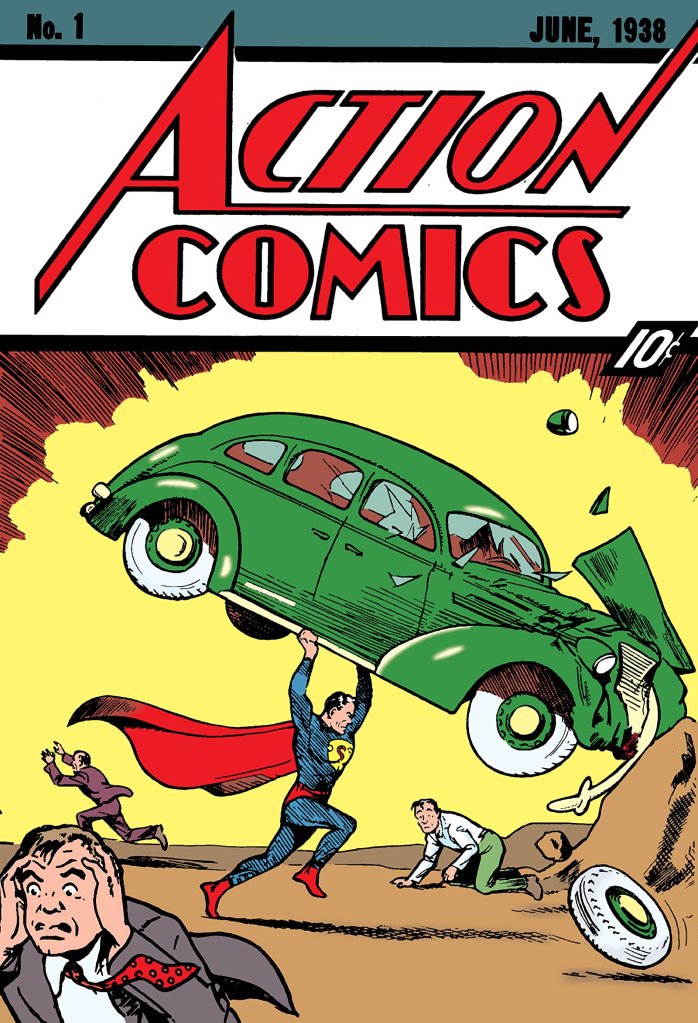
I’ve been doing a deep dive of late into the early days of Superman, researching everything that is known or can be established about the development, purchase and evolution of the Man of Steel across his first decade, when he became virtually immediately a Pop Culture Phenomenon that conquered all forms of mass media simultaneously. The story we all know about two kids from Cleveland coming up with this fantasy figure and then losing him for a token payment isn’t the whole of that story, not by a long shot. It’s a winding and byzantine affair, with good guys and bad guys on all sides. Along the way, I’ve come across several letters sent back and forth between Detective Comics Inc, represented most often by Jack Liebowitz, who would today be considered the firm’s Chief Finance Officer, and Jerry Siegel, representing the team of Siegel and Shuster. And so I’m going to share a couple here.
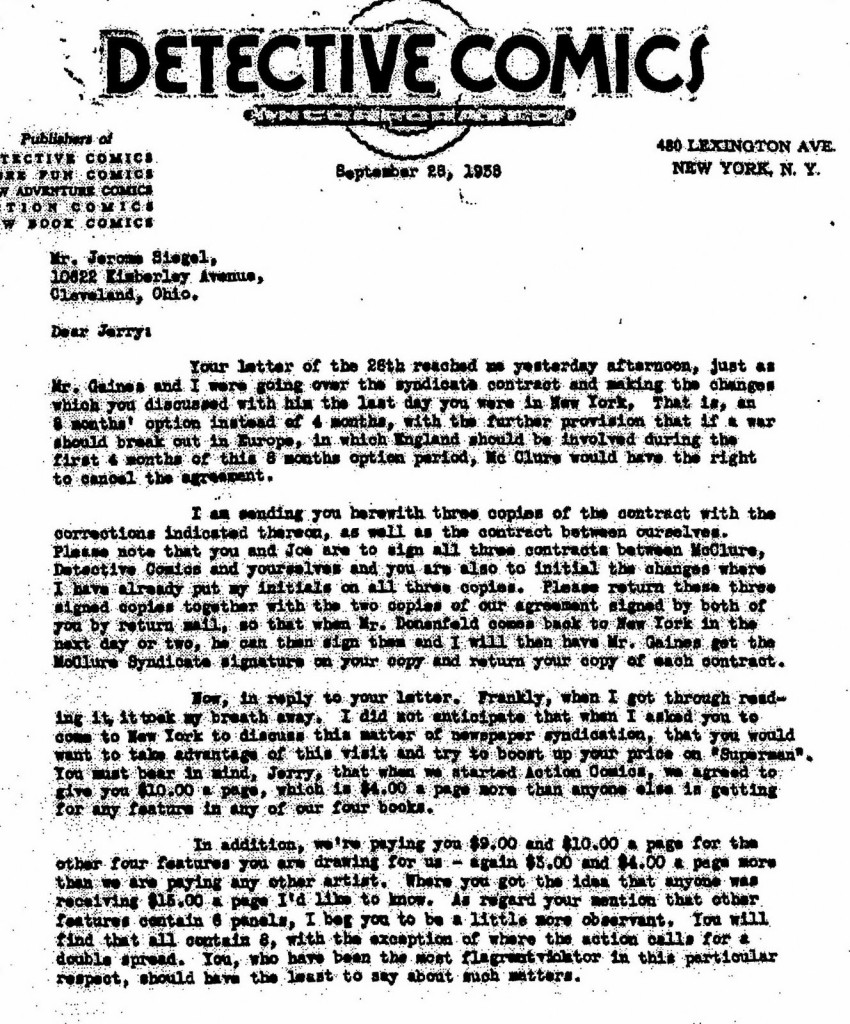
Above you see the first page of a letter sent by Jack Liebowitz to Jerry Siegel on September 28, 1938. For context, as this point, ACTION COMICS #5 had been published and the character of Superman was heating up. The McClure Newspaper Syndicate, which had been noncommittal about their interest in developing Superman as a newspaper strip, suddenly showed new signs of life, which had caused Siegel to write to Detective Comics and request that they return all rights but first publication to Superman to Siegel and Shuster. As you can imagine, Jack Liebowitz and his boss Harry Donenfeld weren’t having any part of that.
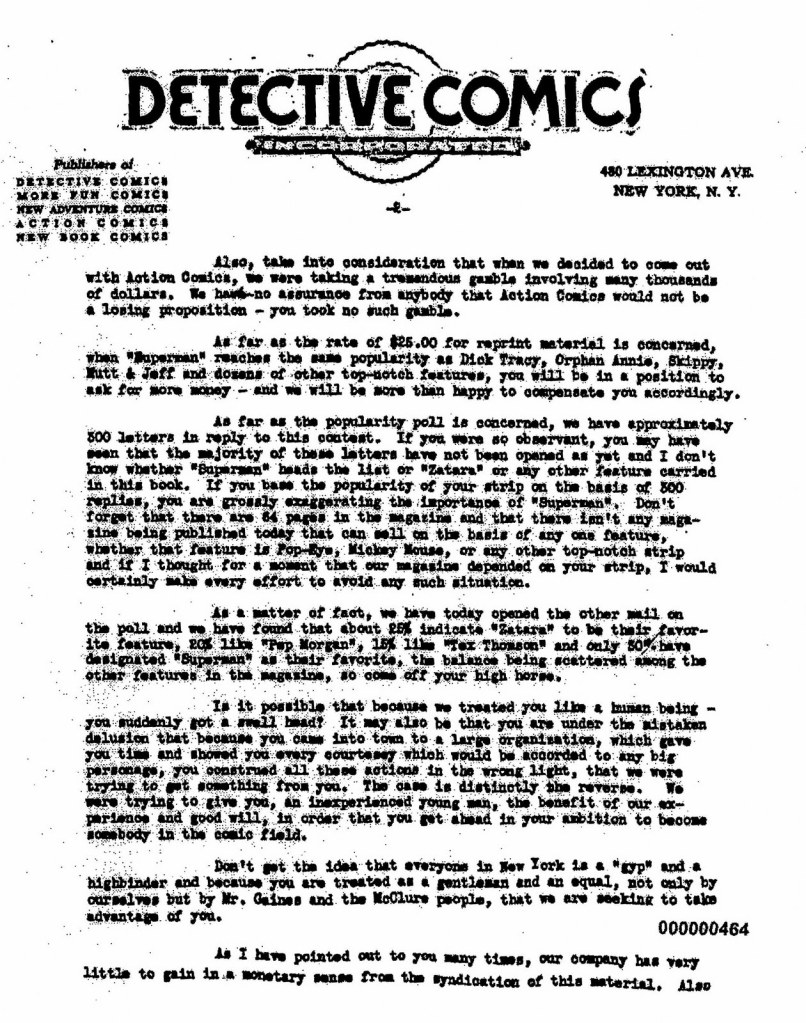
Liebowitz was a tough guy, and he had information that Siegel didn’t: he knew exactly how popular Superman was proving to be and just how much money there was to be made on the Man of Steel’s adventures. But especially at this early sage, he wasn’t certain whether the appeal of the character would work without its creators, Siegel and Shuster. So he would often casually threaten the team with dismissal while working to keep the pair in line. Here, he misrepresents the response they’ve been getting to a recent ACTION COMICS poll asking the readership to name their favorite features in the magazine. Superman ran away with this poll handily, but by limiting his pull-source to a single day, Liebowitz is able to tell Siegel that Superman only represented 30% of the votes, closely followed by Zatara and Pep Morgan. This is, to use a term, complete BS, nobody had any interest in a Zatara newspaper strip or a Pep Morgan radio series, but it was all part of the pantomime that Liebowitz would consistently put on in order to keep Siegel and Shuster on the back foot and producing for the organization.
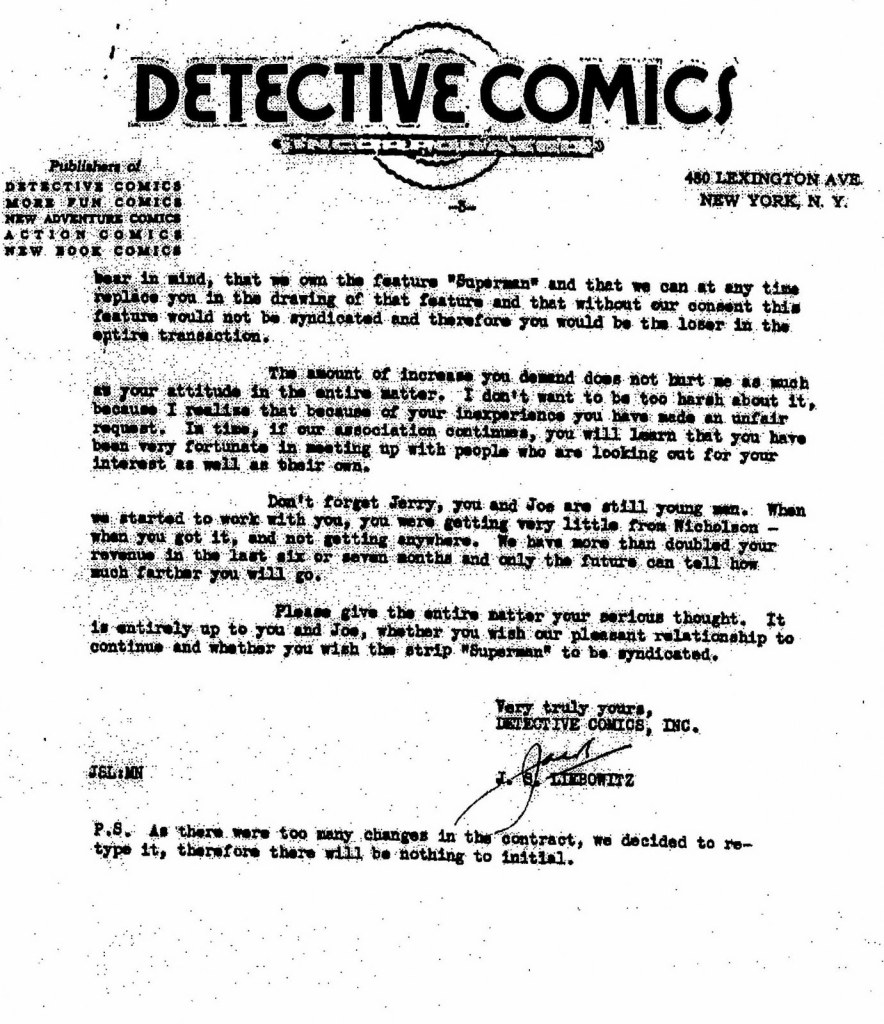
It’s the act of a sharp businessman: he’s hurt by insinuations that he and Detective Comics Inc are raking in big money while paying Siegel and Shuster only a tiny fraction, all while he scoops fistfuls of dollars up from every direction. That said, in the syndication deal for Superman that was worked out, all of the profits from the newspaper strip incarnation went to Siegel and Shuster, with Detective Comics taking only a small production fee. This was seen, I think, as a good faith gesture, and it resulted in Jerry and Joe suddenly having more money than they’d ever seen before. So there were mutual benefits to this arrangement. Still, Jerry couldn’t ever quite get over the fact that he wasn’t seeing all of the returns from Superman, that he and Joe had made an ill-considered deal at the wrong time and forever lost control of their now-famous creation. This feeling of injustice permeates all of Siegel’s correspondence of this timeframe, and it’s ultimately what eventually causes him to break with the company and attempt to sue them for control of the Superman property–an action that would be unsuccessful.
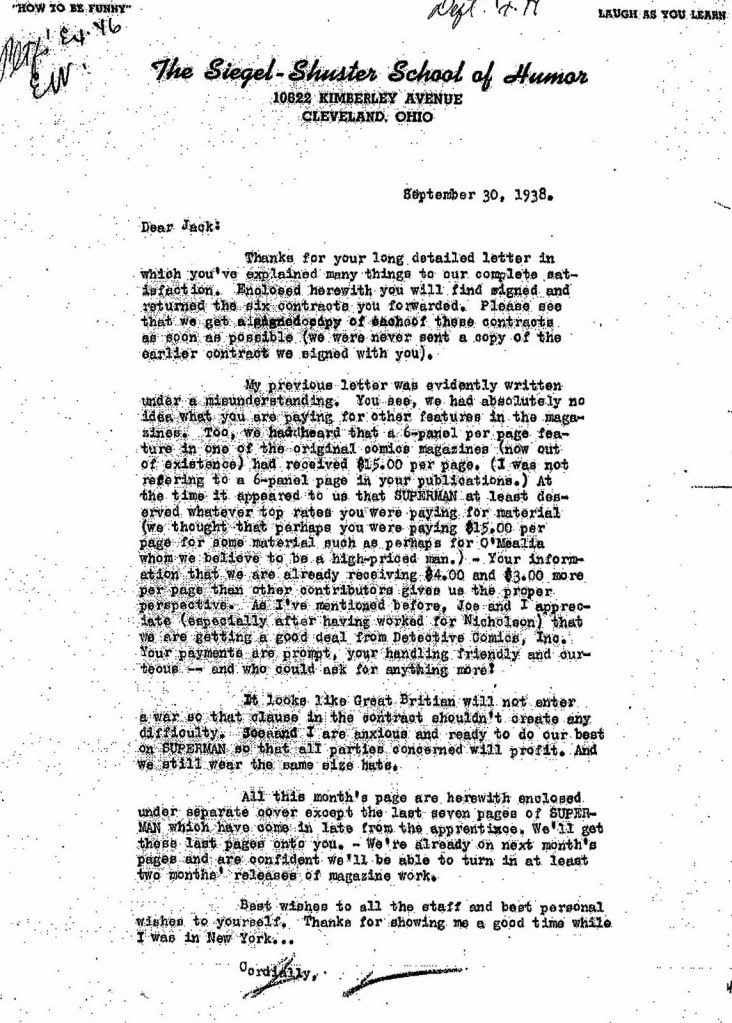
Whether he’s being sincere or writing the above through gritted teeth is difficult to say, but Siegel responds to Liebowitz two days later (on letterhead for the Siegel and Shuster School of Humor, a correspondence course that the duo had brainstormed as one of their money-making schemes. It didn’t really go anywhere.) and he’s as obsequious to a fault. Clearly, Liebowitz’s threat about removing him and Joe from Superman and bringing in other talent to produce the series had momentarily cowed him. Siegel mentions a rate paid to Leo E. O’Mealia that is almost certainly accurate and which he may have gotten from the horse’s mouth–at one point, Siegel had approached O’Mealia to develop Superman as a strip with him, so the two men were in contact with one another prior to this time. And in fact, he’d done the cover to ACTION COMICS #5, the latest issue on sale at eh time these letters were written.
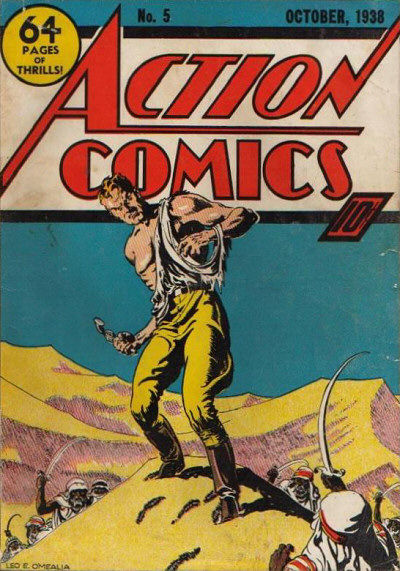

Excellent reading…..having worked in the music business , you better have a lawyer read everything before you sign anything!
LikeLiked by 1 person
With the benefit of hindsight, Siegel and Shuster made a bad deal, and they were outgunned by Leibowitz and Donenfeld. At the same time… (and Leibowitz makes this point) DC took the risk with publication and Superman could have been a nothing-burger. How big that risk was is only the space the first Superman takes up in Action #1. It gets lost that S&S were paid pretty well to produce the strip for 10 years… but their agony is also understandable given that they sold a goldmine for a song.
I wonder what amount in the 30’s they could have sold Superman for that would have seemed like a reasonable deal? The feature turned out to be worth millions, but no one in 1937 was going to give them $1000 let alone $1,000,000.
LikeLiked by 1 person
A reasonable deal would have been to keep a percentage.
LikeLiked by 1 person
All you can generally recover when a new businesss fails due to someone’s fault are your set-up costs. So it is tough to tell how things will gp. Most things are a mystery until you have a LOT of data. You wind up hoping the mystery does not prove to be an on-going tragedy
By the 1970s and 1980s there were stochastic techniques for valueing options (like the Black-Scholes Option Pricing Model) that MIGHT be applied but even there it is a very Scientific . . . Wild A–ed Guess (“SWAG”).
In the 1930s, none of that existed (and post 2008, this kind of number crunching is looked at warily without a LOT of data),
LikeLike
Detective Comics was not taking any large risk with the publication of Action #1. They were already publishing other monthly books without hit character. They knew enough about comics publishing that they wouldn’t lose their shirts on this venture.
LikeLiked by 2 people
“Wouldn’t lose their shirt” versus “making enough money to want to consider continueing to do this,” though ia probably more the calculus.
These guys did other things, not least Harry Donnenfield’s Independant News Distributors.
The whole thing was about hedging risk and increasing opportunity.
LikeLike
Very interesting!
LikeLike
I interviewed liebowitz in 1987 for the variety issue of the 50th anniversary of superman. Even at 85 he was scary and intimidating..
Tom sciacca
LikeLiked by 1 person